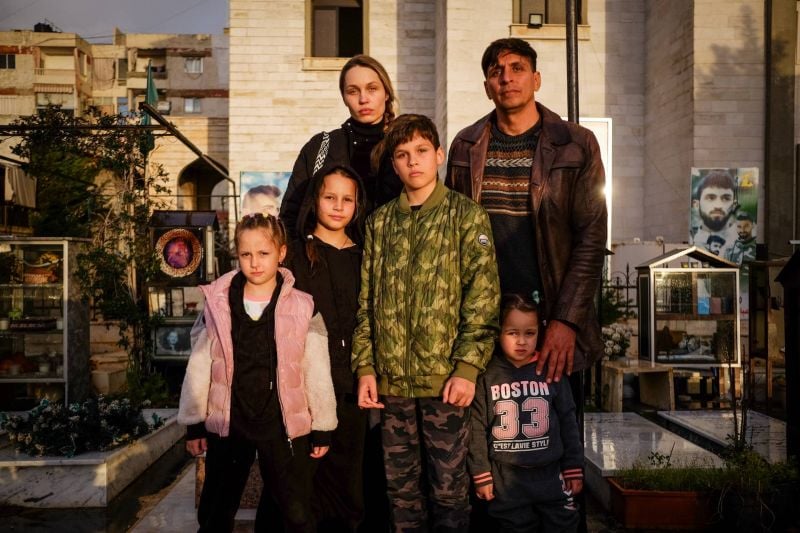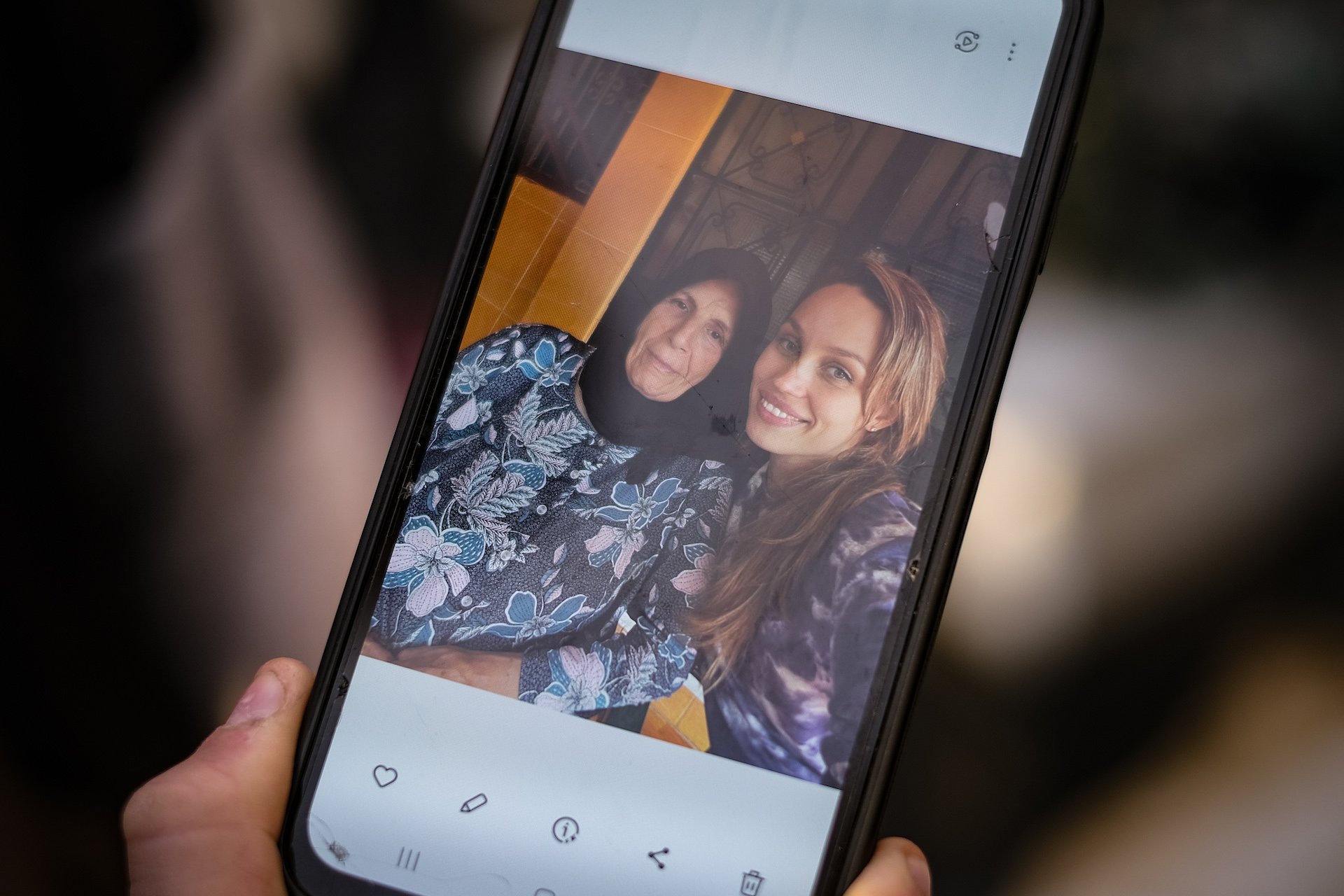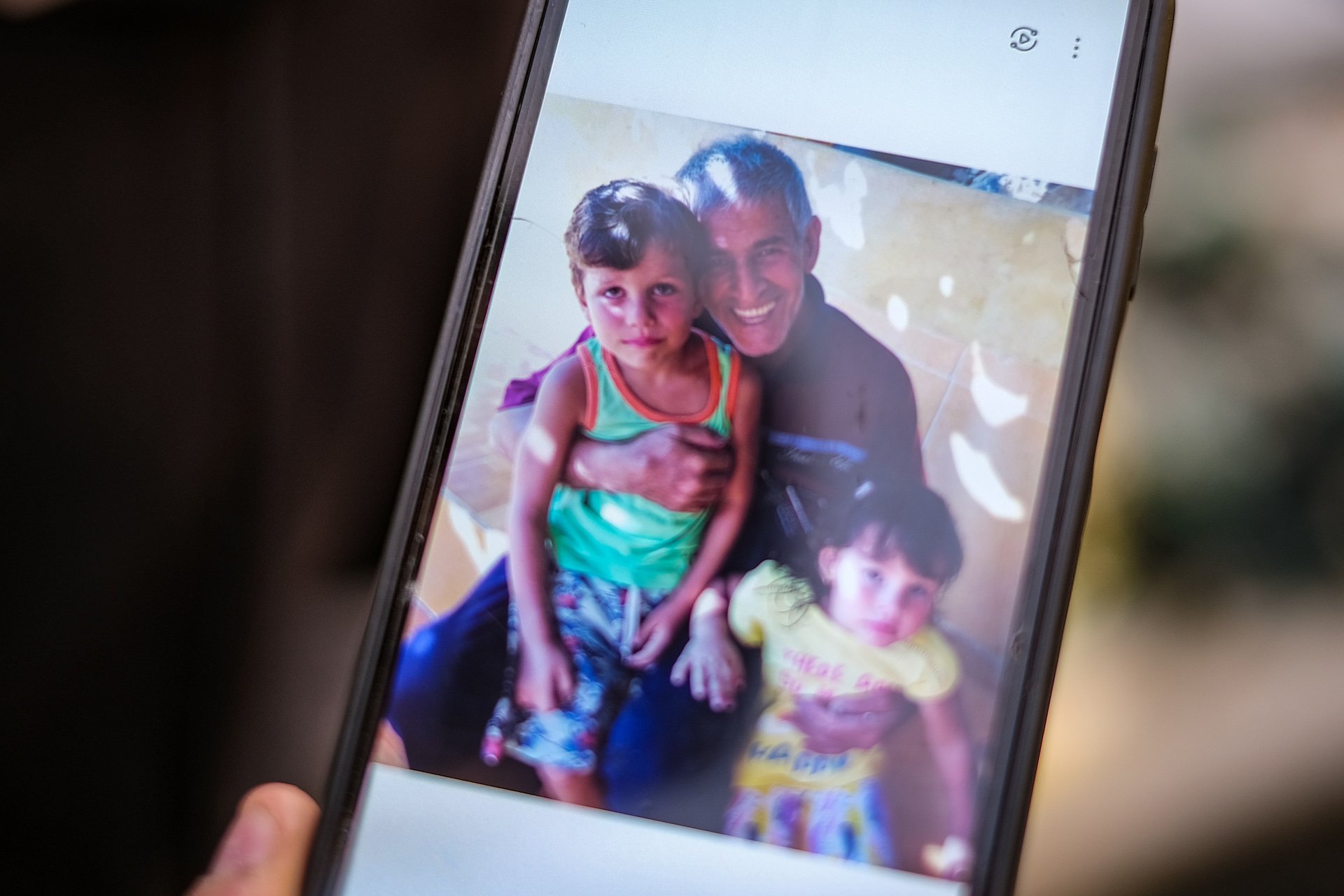
Mohammad Hamdan (top, right) poses with his wife and children in the southern Beirut suburbs at the funeral of his parents Hussein Hamdan and Manar Abadi. An Israeli airstrike on their home killed the elder Hamdan and Abadi on Feb. 28. (Credit: João Sousa/L'Orient Today)
BEIRUT — A fresh pot of coffee ready to sip. Fruits, manaeesh, and homemade kaak bread: that’s how 11-year-old Marcel Hamdan remembers his grandparents Manar Abadi and Hussein Hamdan.
These memories are now all he has left of them after an Israeli airstrike struck and killed the elderly couple in the southern Lebanon village of Kafra on Feb. 28.
Marcel had been living in the village with his grandparents, three siblings and parents for the past seven years.
“Living with them was very fun. My grandma and I would make jokes all night that no one but us would understand, and even when I’d go to bed we’d start sending small voice notes and cracking up with laughter,” Marcel tells L’Orient Today.
His younger siblings would play “horsie with Teta and Jeddo at 10 p.m. sometimes. They’d even wake them up from their naps on the couch to play it and they would always wake up and sit us on their backs and pretend to be a horse,” Marcel recalls.
Marcel and his siblings and parents narrowly escaped death the night his grandparents were killed.
They happened to be just 100 meters away from their grandparents’ house, visiting a friend of Marcel’s father when they heard the loud boom.
 A family member shows a picture of Manar Abadi with her daughter-in-law. An Israeli airstrike on their home in Kafra, southern Lebanon, killed Abadi and her husband, Hussein Hamdan, on Feb. 28. (Credit: João Sousa/L'Orient Today)
A family member shows a picture of Manar Abadi with her daughter-in-law. An Israeli airstrike on their home in Kafra, southern Lebanon, killed Abadi and her husband, Hussein Hamdan, on Feb. 28. (Credit: João Sousa/L'Orient Today)
On a rainy afternoon in March in Beirut, Manar and Hussein’s family gather to mark seven days since the killing of the couple.
Their son Mohammad Hamdan tells L’Orient Today that he had repeatedly told his parents to leave their home and farmland in Kafra and go to Beirut until “we can see how the situation will unfold. After trying to talk them into it they relented and went to their house in the southern suburbs of Beirut.” Mohammad and his family stayed behind in Kafra.
Once in Beirut, Mohammad says, “my father was like a fish out of water, he couldn’t bear to be away from his land.”
The 73-year-old farmer made a living selling crops while his 63-year-old wife Manar, a homemaker, held her extended family close.
Mohammad says his parents were deeply upset at Israel’s onslaught in Gaza, and would often cry about the children there killed by Israeli bombs, crushed beneath their own homes.
After around 20 days in Beirut, Hussein, nicknamed Abu Ali after his oldest son, said he couldn’t bear to be away from his olive and fig trees that he had been tending to for the past 30 years. Without notifying Mohammad, he and Manar packed their things and headed back south.
The couple arrived in Kafra at 4 p.m., and at 10 p.m. — when Mohammad heard the loud boom next door — an Israeli airstrike killed the two grandparents.
 A family member shows a picture of Hussein Hamdan with two of his grandchildren. An Israeli airstrike on their home in Kafra, southern Lebanon, killed Hamdan and his wife, Manar Abadi, on Feb. 28. (Credit: João Sousa/L'Orient Today)
A family member shows a picture of Hussein Hamdan with two of his grandchildren. An Israeli airstrike on their home in Kafra, southern Lebanon, killed Hamdan and his wife, Manar Abadi, on Feb. 28. (Credit: João Sousa/L'Orient Today)
Since Oct. 8 Hezbollah and Israel have been exchanging fire daily. Around 90,000 Lebanese civilians had been displaced from their hometowns and villages along Lebanon’s southern border with Israel.
Hezbollah says its actions are in support of the “Palestinian resistance in Gaza,” primarily its key ally Hamas, which launched a surprise attack on Israel on Oct. 7. Israeli forces responded with a punishing bombing campaign on Gaza that has so far killed more than 31,000 people and cut off basic food supplies.
Hezbollah has refused to negotiate on ending the cross-border fire as long as Israel's war in Gaza continues.
Meanwhile in southern Lebanon, Israeli shelling has killed 221 Hezbollah fighters and 47 civilians, according to L’Orient Today’s latest count.
Manar and Hussein’s family now count the beloved grandparents among the dead.
‘He vowed never to leave his land’
“My father had returned to Kafra in the year 2000 after the liberation of southern Lebanon from Israel and he had vowed to never leave his land again,” Mohammad says.
From 1985 till the year 2000, Israel occupied southern Lebanon. During those 15 years, Israel and Hezbollah battled in the south before Israel was forced to withdraw on May 24, 2000.
That year saw tens of thousands of southern Lebanese return to their home villages, now free for the first time in 15 years.
Hussein and Manar were among them. Still, they left behind memories in their wake.
When the couple were living in Beirut during the Israeli occupation, Hussein owned a small restaurant in the Hay al-Sellom neighborhood, called Hamdan’s Restaurant.
The couple’s funeral this month was held in that same neighborhood, Mohammad says. “The locals kept hugging me and saying, ‘You are the son of the dearest Abu Ali,’ and that sent me to tears.”
“Almost 20 years after closing the restaurant they still remembered him, my dad, may Allah have mercy on his soul,” Mohammad adds. “He was one of a kind.” Tears glisten in his eyes as rain falls near the cemetery where the family holds the funeral.
He remembers feeling like a young boy again in his mother’s embrace.
“She would wait for me and my wife to have coffee with her and would refuse to drink her coffee without us,” Mohammad says. “My wife called her ‘mom,’ and the smile would never leave my mom’s lips.” Manar was also a cancer survivor.
He was used to living close to his parents, with whom he and his own young family shared the house in Kafra. Though Mohammad lived for several years in Russia, where he met his wife, the two of them decided to return to Mohammad’s village of Kafra seven years ago. He wanted his children to grow up on their land and be close to their grandparents.
“If we all left our land, who would remain? My family and I will remain in Kafra until the very end,” Mohammad tells L’Orient Today.
“I have machinery and equipment for construction and my work is continuing. We are the people of this land and we will remain here. We can't let Israel push us out of our land,” he adds.
“My dad worked so hard on this land I can’t leave it; I wouldn’t bear it.”
